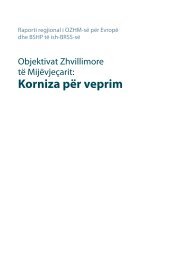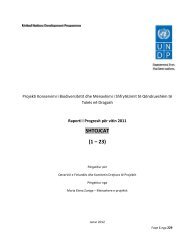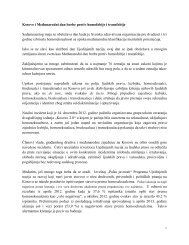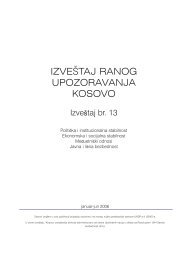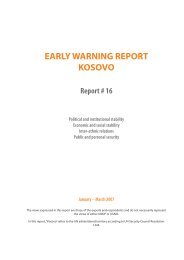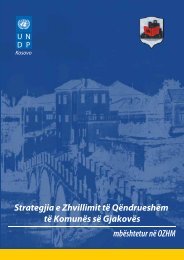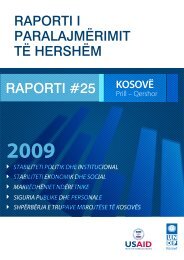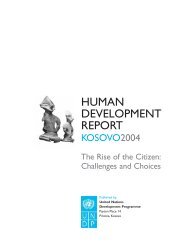Kosovo Human Development Report 2010 - UNDP Kosovo - United ...
Kosovo Human Development Report 2010 - UNDP Kosovo - United ...
Kosovo Human Development Report 2010 - UNDP Kosovo - United ...
You also want an ePaper? Increase the reach of your titles
YUMPU automatically turns print PDFs into web optimized ePapers that Google loves.
Ineffective institutional support<br />
mechanisms. Where institutions are<br />
inefficient, unaccountable and unresponsive<br />
they cannot create opportunities<br />
or provide an adequate safety net<br />
for the socially excluded. Institutional<br />
failures can extend to private sector,<br />
faith-based and civil society institutions<br />
– which can deepen social exclusion<br />
by failing to promote and provide<br />
equality of opportunity to all groups<br />
and promoting rooted concepts.<br />
Only two streets have not been paved in my neighbourhood,<br />
and one of the streets is inhabited by Roma, where I live, and<br />
there are 10-12 houses with Roma in the other street and only<br />
these two streets are not paved.<br />
RAE participant of a focus group<br />
Weak rule of law. Where rule of<br />
law does not operate to prevent the<br />
expression of prejudice, social and political<br />
biases can rule individual opportunity.<br />
In such climates, discrimination<br />
on the basis of ethnicity and gender<br />
may result in exclusion from the labour<br />
market or participation in political processes.<br />
In extreme cases, it can lead<br />
to overt hostility and violence against<br />
certain groups. Lack of trust in the rule<br />
of law process can prevent excluded<br />
groups from taking up their rights<br />
despite the existence of legislation to<br />
protect them.<br />
Discriminatory social values and<br />
cultural practices. Cultural liberty is<br />
critical to human development. Freedom<br />
to express a cultural, religious,<br />
ethnic or sexual identity and to enjoy<br />
gender equality is a fundamental human<br />
right. Where this freedom goes<br />
against a socio-cultural norm, exclusion<br />
is a very real risk. There are multiple<br />
manifestations of this type of exclusion<br />
across society; for example, where<br />
26 | KOSOVO HUMAN DEVELOPMENT REPORT <strong>2010</strong><br />
minorities lack cultural services to support<br />
their native culture, or are unable<br />
to find jobs because of their skin colour.<br />
It is equally possible for groups to<br />
participate in their own exclusion – a<br />
far more challenging situation. Where<br />
minority groups do not integrate sufficiently<br />
to read and write the national<br />
language, for example, their access to<br />
education, political life and to justice<br />
becomes extremely precarious. 23<br />
There are cases where people are hidden<br />
and locked in their houses in villages.<br />
Occasionally we are lucky and<br />
find new members in town who have<br />
disabilities and we invite them to meet<br />
with us in order to have communication<br />
with other people who face similar<br />
difficulties regarding social exclusion.<br />
There are households in which<br />
family members with disabilities are<br />
totally isolated from the outside world.<br />
Disabled participant of a focus<br />
group<br />
Inequalities between groups. Inequalities<br />
that exist de facto or de jure<br />
among groups can increase exclusion.<br />
These can include, for example, inequalities<br />
in terms of class/wealth and<br />
access to resources. Frequently, they<br />
include gender relations shaped by<br />
formal and informal rules for men and<br />
women, boys and girls to participate<br />
in decision-making and control resources.<br />
In ethnically diverse societies,<br />
dominant ethnic groups may define<br />
the degree and form of discriminatory<br />
practices towards disadvantaged<br />
groups including language and religious<br />
practices. Social groups living in<br />
certain regions with poorly developed<br />
infrastructure may have limited access<br />
to state support and services that can<br />
lead to their exclusion.<br />
Even if all social groups are provided<br />
with the same level of opportunity,



